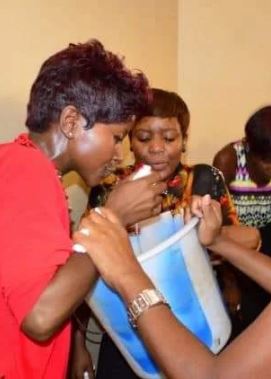 As is my habit, I was listening to a BBC phone-in program and washing dishes. The program’s discussion had to do with cultural change in Africa, and one of the comments—The speaker angrily wrote off Africans as superstitious and uneducated—stunned me, almost made me drop my precious Nescafe coffee mug. Why the malice, yo? The comment was bitter. It lacked substance. It perpetuated the Africans-are-superstitious stereotype. It also came close to striking a nugget of truth.
As is my habit, I was listening to a BBC phone-in program and washing dishes. The program’s discussion had to do with cultural change in Africa, and one of the comments—The speaker angrily wrote off Africans as superstitious and uneducated—stunned me, almost made me drop my precious Nescafe coffee mug. Why the malice, yo? The comment was bitter. It lacked substance. It perpetuated the Africans-are-superstitious stereotype. It also came close to striking a nugget of truth.
Westerners smirk at the mention of witchcraft. Those fanatical Puritans! Those superstitious, uneducated, zealous… For Malawians, and I imagine for many Africans, witchcraft is very real. Being superstitious and poorly educated go hand in hand, especially if you view witchcraft and education as competing explanations for strange phenomena like dreaming, earthquakes, human behavior, and meteorites. Western science and emphasis on critical thinking has debunked the mystery of cosmic happenings, terrestrial events and our behavior to a certain extent, but traditional African beliefs, in their search for an explanation, often find a scapegoat, witchcraft.
CASE STUDY 1: I was going to buy eggs and bread to make French toast on Saturday morning, when I ran into a familiar face. He was a retired army officer. Curious about the Malawian military, I struck up a conversation on the subject. He listed qualifications, described their training, and finally mentioned combat. Apparently he had seen peace-keeping action in Somalia or Rwanda—I don’t remember.—and worked with Americans. He said, “I know you westerners don’t believe in witchcraft, but tfighting somehow disturbs you. That’s witchcraft disturbing you.”
Battle “somehow disturbs you.” I think westerners would get the man a therapist to help him work through what is most likely post-traumatic stress disorder (PTSD). For Malawians, though, PTSD, insanity, depression, even anxiety is witchcraft.
CASE STUDY 2: I was drinking beers with teachers. They were rattling away a mile a minute in Chitumbuka, so I just sat and sipped, sat and sipped. A teacher eventually turned to me to explain: “We were just saying how wives bewitch their husbands. They make them stay at home, help sweeping, cleaning, or what what.” Not wanting to be disagreeable, I sat and sipped.
To put this in context, men do not help around the house in Malawi. That is women’s work say the locals. Things that disrupt the flow of life, daily expectations, things that go against the grain are often pinned on witchcraft. Of course, westerners wouldn’t describe a helpful husband as bewitched.
CASE STUDY 3: A friend walked me to my home at night. I looked up to admire the Milky Way soupily laid out across the sky when an enormous meteorite whizzed into the atmosphere. “Wow! Did you see that?” I asked. “That was a witch’s plane.” What the hell, I thought. A witch’s plane?
Malawians updated the witch on a broom image. They fly invisible airplanes nowadays.
I could give you more examples. The guy who told me to spit on my urine to protect it. Witches use body fluids to cast spells, I guess. Another guy who told me I have nightmares because I’m bewitched. I tried to explain I was on prophylaxis that causes vivid dreams, but as the angry BBC gal would say, the science made no difference.
The reality of witchcraft here runs deep, no matter how untenable it seems to westerners. As happened at the hands of our Puritan brothers, people sometimes die when an angry mob confronts their sacrificial lamb, their explanation for the unexplained, their witch. Crying witchcraft is an easy and comfortable solution. No need to analyze the intricacies of battle, the personalities involved, the movement of matter through space, the concept of heat and friction, but then again my students have asked where Brazil is in the United States. They didn’t believe me when I told them man had walked on the moon. I had to produce photographs in the encyclopedia. They didn’t not know about whales. How do you explain PTSD when “whale” is still new concept?
Only a hundred and twenty years ago, western explorers penetrated Africa’s interior and found many people still living in the Iron Age, and so my question for the BBC caller would be what do you expect? Witchcraft is the traditional system and the most comfortable one for making sense of the new. I wonder too if one day, perhaps a century from now, there will be new scientific explanations of psychology or matter that make our current understanding seem to be just quite amusing.
BY Jerrod Dolenz, PCV, Malawi
Source : http://jerrodpcv.blogspot.com/




No comments! Be the first commenter?